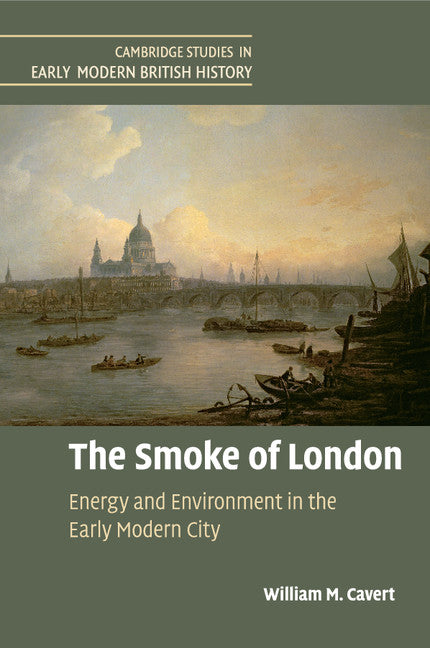Freshly Printed - allow 8 days lead
Couldn't load pickup availability
The Smoke of London
Energy and Environment in the Early Modern City
William M. Cavert investigates the origins of urban air pollution, explaining how this problem arose during the early modern period.
William M. Cavert (Author)
9781107421318, Cambridge University Press
Paperback / softback, published 19 October 2017
294 pages, 3 b/w illus.
22.8 x 15.3 x 1.5 cm, 0.44 kg
'Until recently, environmental history has remained something of a curiosity in early modern British history. With The Smoke of London, Cavert has done both fields a great service in showing the importance of each to the other. This is a book that should be read by anyone interested in urban, environmental, British, or early modern history.' John Emrys Morgan, Canadian Journal of History
The Smoke of London uncovers the origins of urban air pollution, two centuries before the industrial revolution. By 1600, London was a fossil-fuelled city, its high-sulfur coal a basic necessity for the poor and a source of cheap energy for its growing manufacturing sector. The resulting smoke was found ugly and dangerous throughout the seventeenth and eighteenth centuries, leading to challenges in court, suppression by the crown, doctors' attempts to understand the nature of good air, increasing suburbanization, and changing representations of urban life in poetry and on the London stage. Neither a celebratory account of proto-environmentalism nor a declensionist narrative of degradation, The Smoke of London recovers the seriousness of pre-modern environmental concerns even as it explains their limits and failures. Ultimately, Londoners learned to live with their dirty air, an accommodation that reframes the modern process of urbanization and industrial pollution, both in Britain and beyond.
Prologue: the smoke of London
Part I. Transformations: 1. The early modernity of London
2. Fires: London's turn to coal, 1575–1775
3. Airs: smoke and pollution, 1600–1775
Part II. Contestations: 4. Royal spaces: palaces and brewhouses, 1575–1640
5. Nuisance and neighbours
6. Smoke in the scientific revolution
Part III. Fueling Leviathan: 7. The moral economy of fuel: coal, poverty, and necessity
8. Fueling improvement: development, navigation, and revenue
9. Regulations: policing markets and suppliers
10. Protections: the wartime coal trade
Part IV. Accommodations: 11. Evelyn's place: fumifugium and the royal retreat from urban smoke
12. Representations: coal smoke as urban life
13. Movements: avoiding the smoky city
Epilogue
Bibliography
Index.
Subject Areas: Environmentalist thought & ideology [RNA], Social & cultural history [HBTB], Early modern history: c 1450/1500 to c 1700 [HBLH], British & Irish history [HBJD1]


